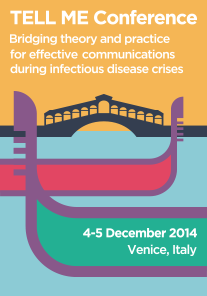Why not protect yourself and your family?
During a recent TELL ME meeting in Haifa, Professor William Fisher, of Western University in London, Ontario, analyzed the reasons of vaccine hesitancy or refusal and how to overcome it. This is a very important topic in view of a possible pandemics, in which the preparedness of states could be compromized by population’s reluctancy to be vaccinated. Both the aspects of people’s attitude to vaccines and of the weight of narratives and urban myths in this field have been deepened by documents already produced by TELL ME project. The international journal Human Vaccines & Immunotherapeutics has just dedicated a special focus to vaccine acceptance and hesitancy.
During the recent TELL ME meeting, it has been pointed out more than once that public information on these topics should not be limited to the moment of the emergency; only through a constant, widespread and transparent risk management, even when the risk itself is not ongoing, it will be possible to develop a timely and proper reaction.
“However, we should remember that, in order to obtain a right response, giving a correct information is not enough,” made clear professor Fisher, who had developed the IMB Information-Motivation-Behavioural skills) model more than twenty years ago. “To implement a specific behavior, like, for instance, vaccination, people should know not only everything related to the vaccine and the disease from which it should protect; people should also be motivated and put in the best practical conditions to do that.”
In fact, beyond the hard core of ideological resistance to vaccination, a wide section of population open to the dialogue does exist. Even if they do not adverse vaccination, these persons do not undergo non-mandatory vaccinations (particularly the seasonal ones against flu) for practical difficulties or because of a lack of time. Institutions may intervene even on these organizational issues with many kinds of incentives, such as a vaccination campaign on workplaces.


